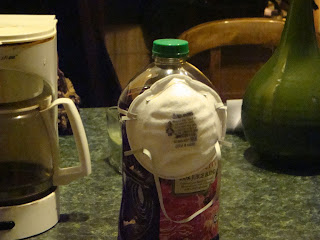 |
| Humpback whale and seagulls waiting for the herring |
 |
| Whales on the prowl |
 |
| Seagulls taking a break |
 |
| Lining up at the airplane float |
 |
| Herring spawn discoloring the water |
 |
| Halibut bait |
 |
| jigging for herring at the harbor |

All winter long there have been four or five whales hanging out in front of town. Usually they go elsewhere for the winter, but I think that this winter, there was enough feed to keep them here. I 'm not certain what they were eating but I suspect it was small herring. A few weeks ago, much larger herring started showing up at the small boat harbor. As is the custom here, people started bringing out their gill nets and stringing them across the empty boat stalls, and herring jigs started flying off the shelves at Tideland Tackle. Herring jigs typically have six or eight tiny hooks with beads or bits of plastic which resemble plankton.They are jigged up and down and catching multiple herring at once is quite common. It's a quick way to fill up your bait bucket or catch your dinner. When the herring start showing up in numbers, and especially the large spawners, it creates quite the stir amongst men and animals alike. It's been a number of years since I've seen the herring spawn in the harbor, at least in the numbers that are showing up now. I really kind of wish they would go elsewhere- away from the creosote pilings. I was down at the docks the other day and noticed the spawn all over the pilings. It's really a shame. The tide goes out and the eggs above the low water tide line are left exposed. One fellow told me that they can live for up to six hours out of the water, the amount of time it would take for the tide to turn and cover them again. However, I believe the creosote kills the live eggs. It baffles me that they don't have a natural instinct to stay away from such dangerous situations, but apparently God didn't give them a great deal of sense. I sometimes wonder how they have managed to survive for so long. They are an important part of the food chain. Humpback whales, sealions, salmon, trout, otters, seagulls, eagles, and man all eat them. In one picture above you can see that the water has taken on a greenish cast. The herring were spawing right along the beach, under the windows of the Office Bar. The females deposit their eggs and the males fertilize them afterwards, causing the water to turn milky in color. When the tide goes out and exposes the eggs on the beach the crows and ravens have their turn at them. Apparently even the bears enjoy roaming the beaches at low tide and having a healthy snack. In Sitka the herring show up in huge numbers every spring, along with the whales and sealions that are naturally drawn to them There is a market in Japan for herring eggs, so a number of seine boats show up to take advantage of the hours long openings. The Tlingit Indians have traditionally eaten both the fish and their eggs for as long as anyone can remember. They put Hemlock branches in select places where the herring spawn, and retrieve them a few days later, laden with eggs. My neighbor up the street takes his boat down, the Shirley N to Sitka to harvest the eggs every year. When he returns, most of the town shows up at the city float with buckets and garbage bags and plastic totes to share in the bounty which he so generously provides. When I was interviewing some of the old timers who've lived here all their lives, they shared with me how the bay here used to fill with herring and with the King salmon who fed on them. Some years back, in the fifties or early sixties, sardine fishermen came up from California and started harvesting the herring for the oil, sending the fish down to reduction plants. Afterwards, the herring became more scarce, along with the numbers of Kings. Much like the buffalo the herring have been slow to rebound. It's nice to see that there are still some around, even if they aren't in the incredible numbers of years ago. Frankly, with everything out to eat them, I'm surprised that there are any at all. I can only hope that they continue to thrive and that somehow, against all odds, they might one day return in the numbers that they were enjoyed so many years ago.











I love herring fishing!!!
ReplyDeleteCamille
Hi Camille, I do too. I just like catching fish of any kind, but it's even nicer when I can make money doing it.
ReplyDelete